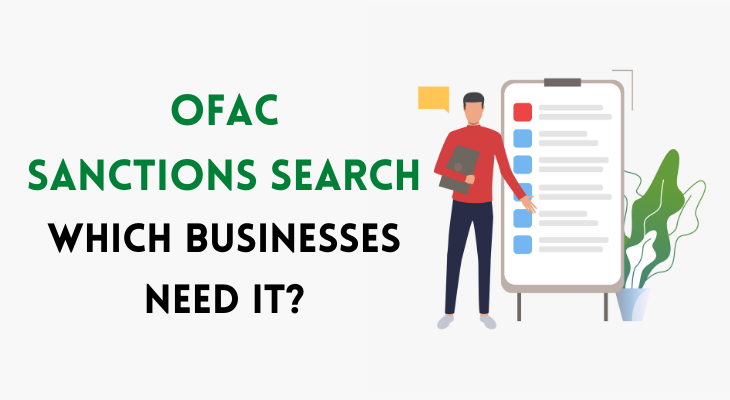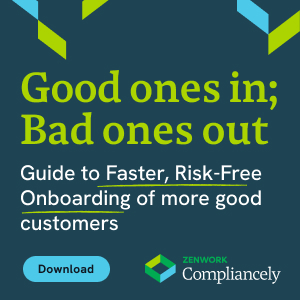OFAC Sanctions Search-Which Businesses Need The OFAC Watch List?

Businesses heavily rely on identity verification solutions. This is due to the rampant increase in identity crime, increased risk factors, and the overall increase in the global non-compliance quotient. Non-compliance quotient, in this context, means the non-compliant or restricted activities as specified by the OFAC, such as drug trafficking, money laundering, terror financing, restricted arms exports, and related regimes.
The business ecosystem has evolved quite a lot in the past few years and so did the risk. The reliance on identity verification solutions, as a consequence, has increased. The un-ignorable impact of risk plays a major role in sanction screening.
Entities and persons that engage in the aforementioned non-compliant regimes will be on the federal radar and as a consequence, will show up in the federal watch lists when searched.
Businesses rely on sanction screening to avoid associating with individuals and entities that are recognized by the federal authorities as a threat to the economic and foreign policy of the U.S.
The OFAC sanctions screening enables businesses to verify the identities of profiles that have been issued OFAC sanctions under a variety of sanction programs and program tags. The background, history, and risk quotient of a profile can be assessed with this check, dismantling the fog of non-transparency in the business ecosystem.
The following will discuss how the OFAC watch list helps businesses with identity verification and risk prevention and the kind of businesses that benefit the most from these security compliance protocols.
Enterprise industries and their reliance on sanctions screening
Enterprise industries, such as banking, insurance, finance, lending, e-commerce, and more, rely on identity verification protocols, which help with verifying the real identities of their associations. Be it employees, independent contractors, executive officers, business partners, and other alliances; every profile must be verified in order to prevent risk.
Sanctions screening helps enterprise industries with not just basic identity validation but with due diligence. Screening a profile against the global sanctions list enables them to identify the profiles, credibility, and risk quotient.
OFAC Sanctions watch list is one such sanction screening protocol that allows businesses to verify if a profile (entity or person) is listed in the U.S. sanctions lists.
Risk prevention with OFAC sanctions screening
Verifying a profile with OFAC sanctions lists allows businesses to find leads to risk history. This means if a person or an entity has been previously sanctioned by the OFAC, the profile will show up in the OFAC sanctions list when searched.
And since sanctioned profiles are considered to be “off-limits” for business conduct, engaging in commercial conduct with sanctioned profiles will result in unprecedented risk, and its consequences could extend to financial and civil liabilities.
-> A guide to verifying businesses and concluding their legitimacy
KYC + AML Compliance
OFAC Sanctions Screening, apart from ascertaining risk prevention and identity validation, also helps with due diligence investigations, KYC compliance, and preventing money laundering risks.
Due diligence requires businesses to check if the profiles are listed in the authorized data lists of the federal agencies. These checks allow businesses to future-proof their businesses from profiles that pose risk. This practice, in turn, enables businesses to prevent associating with potential money launderers or profiles recognized by the OFAC as money launderers.
The risk of onboarding profiles with a history of money laundering and other non-compliant background pushes businesses to regulate their customer onboarding activities with systemic regulatory compliance protocols.
Know Your Customer/Client regime, for example, allows businesses to verify the real identities of the profiles with sufficient proof – empowering the onboarding practice with valid proof of identity.
Improved profile approval
In haste to onboard more profiles and build up the numbers on the customer base, many businesses fail to meet the compliance requirements, which bounces back with non-compliance citations from the federal agencies.
Approving a customer profile requires comprehensive verification of identities with valid proof, and assessing risk with due diligence ops. When businesses fail to incorporate this, profiles will get approved faster but at a cost.
The companies may not be aware of the identities of the profiles they are onboarding, and as a result, could be easily susceptible to creating a safe haven for criminals, potential money launderers, and terror-financing entities.
KYC/AML compliance protocols such as OFAC Sanctions Screening help businesses in this narrative. These practices also help prevent banks from onboarding high-risk profiles, strengthening the customer identification process and compliance.
Accessing OFAC Sanctions watch list easily
The OFAC publishes the identities of sanctioned profiles in sanctions lists under a variety of sanction program tags, each of which is segregated for classified (security) purposes. The OFAC does not have a regular interval for these updates and hence, companies find it hard to validate their high volume of customer profiles against the available data lists.
Compliancely simplifies this process by making the information available in real-time by retrieving the real-time identity matches from the source (OFAC).
This means you can search millions of profiles against Compliancely’s OFAC watch list and get results within seconds. And the best part is that Compliancely automatically re-screens the bulk data if the source (OFAC) updates its data lists, giving you the most recent, relevant, and accurate information at all times.

